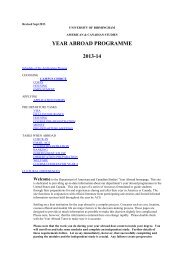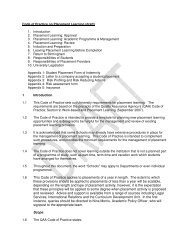Governance and finance of long-term care - University of Birmingham
Governance and finance of long-term care - University of Birmingham
Governance and finance of long-term care - University of Birmingham
Create successful ePaper yourself
Turn your PDF publications into a flip-book with our unique Google optimized e-Paper software.
Allen et al., 2011 <strong>Governance</strong> <strong>and</strong> Financing <strong>of</strong> LTC | European Overview<br />
cash benefits came as a new tool for refunding the LTC system, relying more on a market approach<br />
while not endangering LTC financial sustainability. In Sweden <strong>and</strong> the Netherl<strong>and</strong>s, with relative ease <strong>of</strong><br />
access to formal services, cash benefits appeared linked to a political climate favouring more market-‐<br />
driven mechanisms. In the Nordic countries, aligned with the New Public Management ideas, cash<br />
benefits were considered as a means to fight against the ‘paternalistic <strong>and</strong> inefficient way’ <strong>of</strong> planning<br />
<strong>and</strong> delivering public services, as they would enable the opening <strong>of</strong> the market to non-‐public providers<br />
<strong>and</strong> boost more responsiveness <strong>and</strong> quality through competition (Da Roit & Le Bihan, 2010). In the<br />
Netherl<strong>and</strong>s, cash benefits were also perceived as a tool to fight against the dominance <strong>of</strong> pr<strong>of</strong>essionals<br />
in shaping older people’s choices, by giving them direct purchasing power in seeking <strong>care</strong> arrangements<br />
that would best fit their needs <strong>and</strong> expectations (Evers et al., 1994).<br />
In this regard, cash transfers were designed for people with LTC needs (attendance allowance, direct<br />
payments) to financially compensate the (informal) <strong>care</strong>r they had chosen; some countries also<br />
developed <strong>care</strong> allowances as direct cash payments to the <strong>care</strong>rs. Moreover, individual budgets are<br />
meant as means for users to contract the services they need themselves. In a number <strong>of</strong> cases, the<br />
budgets are also used for paying for informal <strong>care</strong>rs (NL). Both benefits were aimed at helping informal<br />
<strong>care</strong>rs solve the dilemma between working <strong>and</strong> caring, by giving them (indirectly or directly) some<br />
financial compensation for their provision <strong>of</strong> <strong>care</strong>, particularly if they had to stop work or reduce<br />
working hours. One effect <strong>of</strong> this ‘commodification <strong>of</strong> <strong>care</strong>’ (Ungerson, 2003) was to blur the boundary<br />
between formal <strong>and</strong> informal <strong>care</strong>rs <strong>and</strong> bring into question informal <strong>care</strong>rs’ previous status i.e. as<br />
people providing <strong>care</strong> with an engagement based on gift <strong>and</strong> reciprocity; as being non-‐pr<strong>of</strong>essionals <strong>and</strong><br />
not trained to provide <strong>care</strong>; as performing a wide range <strong>of</strong> tasks including emotional support <strong>and</strong><br />
assistance; <strong>and</strong> with no limits to time spent on <strong>care</strong>. In a growing number <strong>of</strong> countries, as a result <strong>of</strong><br />
these cash benefits, it now appears that a proportion <strong>of</strong> informal <strong>care</strong>rs benefit from special training <strong>and</strong><br />
obtain financial contributions based on some form <strong>of</strong> contracting linked to social rights (OECD).<br />
What are the major impacts <strong>of</strong> these changes? Data <strong>and</strong> research are beginning to show that, as cash<br />
benefits were also conceived as cost-‐cutting devices for formal services, in most countries they were set<br />
at a level which usually did not allow beneficiaries to <strong>care</strong> <strong>and</strong> work under good conditions; also, as they<br />
came with a lower level <strong>of</strong> social rights’ coverage than that <strong>of</strong> a worker in the labour market, they<br />
increased their risk <strong>of</strong> social isolation <strong>and</strong> poverty (Fontaine et al., 2009). So it appears that funding LTC<br />
through cash mechanisms to informal <strong>care</strong>rs may contradict the goal <strong>of</strong> a high level <strong>of</strong> employment for<br />
women <strong>and</strong> older people, as it more frequently acts as a ‘<strong>care</strong>-‐trap’ mechanism. Only in the northern<br />
countries where cash benefits spread to a more variable, but rather limited extent (slightly more in NL<br />
<strong>and</strong> FI), were the levels <strong>of</strong> high-‐dependency <strong>care</strong> benefits set to be comparable with pr<strong>of</strong>essionals’<br />
salaries <strong>and</strong> with similar social rights.<br />
It has also been suggested that the introduction <strong>of</strong> cash benefits as a driver for optimizing the balance<br />
between informal <strong>and</strong> formal <strong>care</strong> in the provision <strong>of</strong> <strong>care</strong> delivery in different countries, was strongly<br />
influenced by the historical <strong>and</strong> legal balance in the sharing <strong>of</strong> responsibilities for people with LTC needs<br />
between families, state <strong>and</strong> the market (Triantafillou et al., 2010).<br />
• In countries where families have primary financial responsibility for dependants (EL, ES, FR, IT, SK),<br />
there is also a corresponding assumption <strong>of</strong> their responsibilities for providing practical <strong>care</strong>, thus<br />
allowing the state to continue to limit its financial intervention in formal service provision.<br />
38







![Benyamin Asadipour-Farsani [EngD Conference abstract]](https://img.yumpu.com/51622940/1/184x260/benyamin-asadipour-farsani-engd-conference-abstract.jpg?quality=85)









